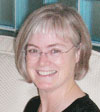


|
|
|
|
|
|
|
|
|
|
|
|
||||||||||||||
|
||||||||||||||
|
|
||||||||||||||
|
||||||||||||||
|
Posted 4/21/2008 Alumna's entrepreneurial effort improving
They say life is a journey, and Arnold School alumna Karen Piegorsch’s has been just that. Now, putting together her years of experience in ergonomics, public health and art, she has found something she’s eager to do for the rest of her life. She has become a social entrepreneur - an undertaking fostered by years in academe, her own creative spirit and a yearning to help people at the bottom of the economic pyramid. For many, social entrepreneur is a new term, but it has been around about 40 years. It describes someone who applies entrepreneurial principles to develop a venture to solve social problems. Profit is not the aim of the social entrepreneur, rather the impact of the venture on society.
The platform for Piegorsch’s entrepreneurial effort is an ergonomic bench she researched and developed for use by Mayan women textile weavers in Guatemala. The women work with a traditional backstrap loom, a device tied around the weaver’s hips on one end and a stationary object such as a tree or post on the other. While kneeling on the ground to weave, the women adjust the tension of the loom by rocking back and forth. The looms produce beautiful cloth, but the back and forth motion is fatiguing and painful for the weaver’s backs, knees and shoulders. Over time it can even lead to chronic disability. That is a serious issue in many countries where income from weaving helps support countless households, said Piegorsch, who resides in Tucson, AZ. She and her husband, Walter, moved there in 2006 when he joined the faculty of the University of Arizona. A Spanish-speaking weaver herself, Piegorsch has had a lifelong interest in indigenous textiles and the people who make them. Moreover, with a background in ergonomics consulting and degrees in physical therapy, industrial engineering and public health, a pilot project to help Mayan weavers sounded almost tailor-made. For two years, Piegorsch worked with the Mayan community to develop and fine-tune the ergonomic bench. She said her doctorate in health promotion, education, and behavior from USC taught her the value of listening to the weavers and involving them in the development process. “We worked with the Mayan communities based on an empowerment model. We didn’t just build a bench for them. We went into the community and learned what they love about what they do, and what they would change if they could” she said. In fact, the idea for this program came from within the indigenous community itself. The weavers tested a number of prototypes before a final design was developed, said Piegorsch. The bench has two parts: “a footrest that provides the weaver with leverage and stability and the specially shaped seat with a curved bottom to make it easier to rock back and forth.” Piegorsch says her weaver co-developers are very happy with a device she describes as “elegantly simple and incredibly robust.” She kept the design low-tech to foster local sustainability and economic independence. The fact that each of the 150 weavers who participated in the pilot project continues to use the bench is testimony that the design is functionally sound and is being accepted into the indigenous culture, she said. “The women tell us that they can now weave for more than three hours at a time without pain. What’s more, their productivity has gone up. A woven garment that used to take three days to complete now only takes two,” Piegorsch said. The success of the pilot project has led Piegorsch to gather a group of like-minded people to create a non-profit company named Synergo Arts. She serves as president of the organization that is “dedicated to helping artists and artisans around the world use ergonomics to maximize their health, income, performance, productivity, and the quality of the art or craft they create.” With a potential market of a half million backstrap weavers in Guatemala alone, Synergo Arts is gearing up this spring to produce an educational DVD for the weavers, and resource kits to enable local carpenters to produce the bench for their communities. Synergo Arts received worldwide publicity recently with Piegorsch telling about the bench in a You-Tube video clip. Click on the image below to play the video.
|
| Columbia, SC 29208 • 803-777-7000 • sphweb@gwm.sc.edu | © University of South Carolina Board of Trustees |
